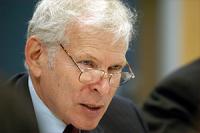“The Age of Consequences” report by the Center for Strategic and International Studies (CSIS) in the US, predicts that scarcity of resources may “dictate the terms of international relations” for years to come as rich countries could “go through a 30-year process of kicking away from the lifeboat.”
Another report says energy needs in 2030 could rise more than 50% above current levels, mainly due to rapid economic growth in China and India. So who’s going to be kicking who?
Leon Fuerth of George Washington University in Washington, DC, one of the CSIS report’s authors and former national security advisor to Vice-president Al Gore, said globalization could end by 2040 due to climate change, causing nations to abandon the drive toward open borders and lower trade barriers and raise the drawbridge to conserve resources.
Elsewhere, Nobuo Tanaka, executive director of the International Energy Agency (IEA), said a 50 per cent rise in energy demand would threaten security and accelerate climate change.
But that’s okay as it will contribute to “improvement in the quality of life for more than two billion people” in China and India.
“This is a legitimate aspiration that needs to be accommodated and supported by the rest of the world.”
Scientific studies suggest the world is already past the tipping point, so the “accommodation and support” called for by Tanaka may not be possible. Perhaps someone should suggest to him that the problem is “global warming,” and greenhouse gas emissions from China and India are as damaging to the planet as those from the U.S.
Subscribe to our newsletter
Stay up to date with DeSmog news and alerts






